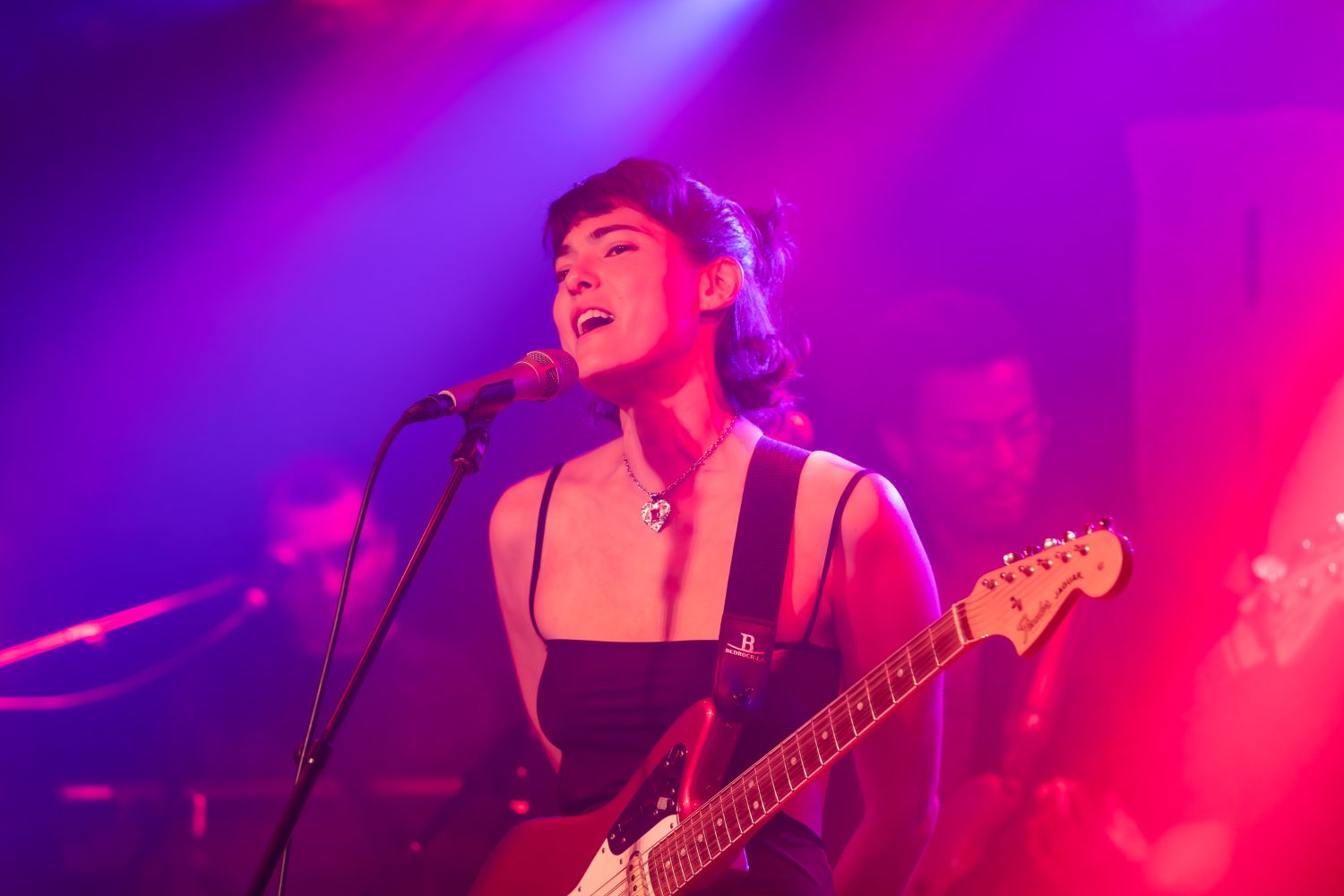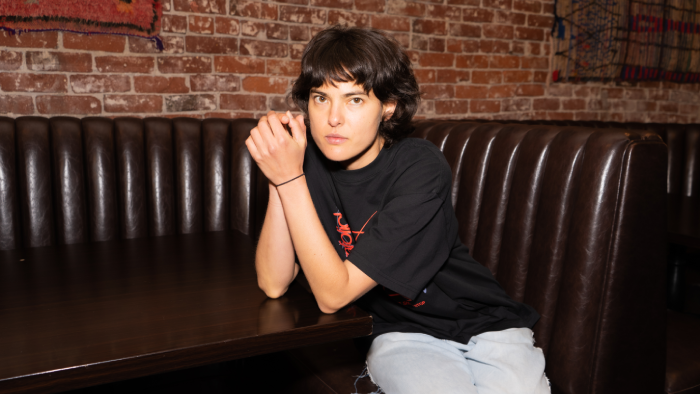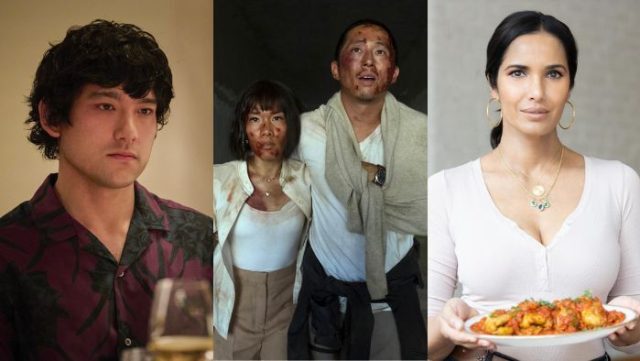On the first track of Miya Folick’s album “Roach,” “Oh God,” the singer-songwriter kicks off with a cry for help: “Oh God, do I need God? Who is God? I’ve never had God.” It’s an audacious opening line for a confession that feels like it can only be uttered out loud during some drunken-night-gone-wrong meltdown on the bathroom floor—proving that Miya isn’t one to bite her tongue.
From cathartic liberation in tracks like “Get Out Of My House” to bittersweet reminiscing in “2007,” the remainder of the musician’s second album continues to embrace that deep level of honesty no matter what emotion is conveyed. It’s a record that details Folick’s rocky journey through adulthood, using vulnerable proclamations and catchy melodies.
Miya Folick sat down with Character Media the night of her album release show at the Moroccan Lounge to detail the process of making her latest project, how she’s grown as an artist and individual since she began music and her “obsession” with cockroaches as the pivotal mascot for the album.

Character Media: What is the significance of the album being titled “Roach?” Did the song “Cockroach” come before or after?
Miya Folick: I’m having trouble remembering, but I think I wrote “Cockroach” in 2020, and then pretty soon after, I started thinking that the album should be called “Roach.” I really liked “Cockroach,” and it felt like it encompassed a lot of the different things on the album. And then I just thought “Roach” was a cooler-sounding title than “Cockroach.” But the first instance of “cockroach” appearing in the writing of the record was “Tetherball”— the lyric goes, “curled up like a cockroach in the dirt, curled up like a roach in the dark.”
CM: So would you say a cockroach was a representation of your fears and insecurities?
MF: The reason that “Roach” started feeling like the right title as time went on was because of what we were experiencing [the pandemic] collectively, and what I was experiencing in my life. The last few years have been difficult for a lot of people. I really started tapping into this feeling of perseverance and resilience, and also noticing myself getting “resilience-fatigue,” just getting tired of being so resilient. Running into an obstacle, starting over again, restarting again, changing directions, all the things that we have to do in order to continue to move forward as people. I don’t think I’m the only person who experiences these kinds of things, but we all encounter these stumbling blocks and we have to keep pushing through. You just keep doing that over and over you notice how exhausting that can be. And to me, it’s not really like the image of a phoenix rising. I think of myself as resilient [in] like a scrappy, gross way—which I think is why the cockroach makes sense to me. It’s both disgusting, but also amazing, and has survived extinction events. I feel like people are obsessed with cockroaches, even though they don’t like them. That’s part of what I was exploring in this album and also in my life is like: what does it mean to be a good person versus a likable person? Are those always the same things? And do I have to be both? It just felt right. And I thought it would look really cool in bold font on the album cover.
CM: Speaking of resilience and trying to be a better person, “Roach” is described as an album about being an “adult in progress.” Are there any habits that you’ve had to break in this process?
MF: So many, a lot of [the habits] I still haven’t broken. The album focuses most on the idea of what it really means to tell the truth. When I was making my first record, I thought of myself as a really introspective person who was really honest with myself. But I realized in the making of this record, that wasn’t really true, and that I lie to myself, and the people around me in tiny, little ways, and I don’t do that anymore, at all. That’s the most astonishing change. I don’t lie about anything. Or if I do, I quickly catch myself and just try to be honest about any time that I’ve been dishonest to myself or to other people. That was more than any other thing that I changed in my life.

CM: How has your music and artistic style evolved over the years ever since you began releasing music?
MF: I’ve encountered so many different collaborators in my career. I’ve definitely been influenced by the people that I’ve been around, which is really cool. You can see the influences of the different players that are playing on the record. Part of what affects the style of music that I play is my community. The other thing is just exploring within myself, because I often talk about how I didn’t really play in bands when I was a teenager. That’s when most people explore — when you’re in a punk band, then in a hardcore band, and then trying to do a bedroom pop project on Logic or GarageBand, I never did that. I didn’t come into music until I was in my 20s. Music for me quickly became a career, I put my first EP out [Insert Name of EP] and I was signed to a label; there were other people and money involved. I don’t think that allowed me to have as much freedom to explore stylistically. I think maybe that’s why all my work is so eclectic because I want to do everything. I want to learn about everything. I have so many interests musically. I still feel like I haven’t gotten that urge to experiment out. My music has changed in so many ways, but at the same time, I’m always going to be interested in the song. I’m a lyrics girl. I’m a melody girl. So those are always the backbone of every song for me.

CM: Is it true you found your band through Tinder in your early days?
MF: Yes! When I first started playing music, I didn’t know anybody and I was just trying to infiltrate the scene. One thing that I did [start] was going to shows all the time. There was a venue in LA called “The Bootleg” that had shows almost every night, and I would go as many nights as I could if I wasn’t working [to] just talk to people…But when it came to putting my band together, I just felt completely at a loss. I was in a relationship at the time, but my friend was on Tinder and sometimes, she’d have me swipe for her just because I was curious. I just started going through her Tinder and thinking, “All of these people are musicians. This is how I find them.” I made a profile that was just like,” I’m just looking for a band. That’s it.” There was a link to my Instagram. The first bass player that I played with in my live band, Bryant, found me on Tinder. We played together for three years. It was pretty amazing. I don’t know if I’d do that now, but I definitely know more people in the music scene now.
CM: As you’ve grown and evolved as a musician, do you think your relationship with music throughout the years shifted as well, whether in good or bad ways?
MF: Oh, gosh, I mean, in both good and bad ways. Sometimes, I think about before I started playing music “professionally”— whatever that means, the way that I would listen to the radio was so different. It was easier to just enjoy, and I miss that sometimes. But I think it’s also just easier to enjoy music when you’re a teenager, so I don’t know if it’s just [because] music has become my career. There are so many ways in which the way that I listen to music now is so much cooler. I feel like I can hear so much more. I have these very clear memories of what it felt like to start understanding music more. I remember very specifically starting to play music, and I was dating someone at the time who was an engineer, and we would listen to records and I’d ask questions like, “What is that? How do they do that? Why does it sound really wide [in] the chorus and then more narrow in the verse?” It’s just interesting to think how limited my understanding of music was when I first started playing. There’s something nice about that, it’s just pure feeling. Now, I’m a little more critical.

CM: What does your creative process usually look like when you’re tapping into such a deep vulnerability that’s shown in the “Roach” album?
MF: My creative process is very different. I’m not a creature of habit. I like to do different things every time, but the place that I go to is always the same. Sometimes, I’ll start on guitar, or I’ll start on the computer, [or] in my car just singing to myself, or on a walk. But the place that I go to is like this separate channel. It’s almost like if I were a TV, and then there is the channel that was like, “I’m communicating with the world normally.” Then there’s this other channel where I just go inside myself, and I’m just trying to communicate pure feelings. Rather than in the normal world, I have to think about other people’s feelings, and about how to best explain this so that somebody understands, or I have to think about what time it is or where I have to be. . . All these other things that you have to do in this world— those just go away. And it’s just this clear channel of expression. Sometimes it’s harder to get there than other times, but that’s where I gotta go.

CM: You started out as an aspiring actress. How has this background affected your artistry such as being able to star in your own music videos?
MF: When I was growing up, I didn’t realize what it meant to be a music artist. If somebody had told me then, maybe that would have been a direction that I imagined for myself. Then I realized that, as a musician, you can do everything that you want to do. You can make music, make music with your friends, and you can make your own art, or make art with your friends, and also make videos, be in the videos, or not be in the videos. That’s when it became really appealing to me. That’s part of the reason why I really quickly started feeling like this is something that I could see myself doing for a long time. I don’t feel like I would get tired of it, because there are so many aspects of it and also because writing songs feels so good. It’s like a fun puzzle all the time, it’s hard to get sick of that. I really enjoy making music videos and being in them. And I feel like my acting training helps with that, but it’s so different. If you put a script in front of me, I’d have to definitely work a lot harder and try to brush off the cobwebs because I haven’t really done that in a while, which I think is a completely different art form than me being myself in front of a camera.
CM: If you could pick a song lyric in this album that you hold closest to your heart, what would it be and why?
MF: it’s hard to pick because I did write them all. They’re all close to my heart, but “I’m a cockroach and you can’t kill me” I think that right now feels very resonant to me. But the lyrics that I resonate with change all the time.









